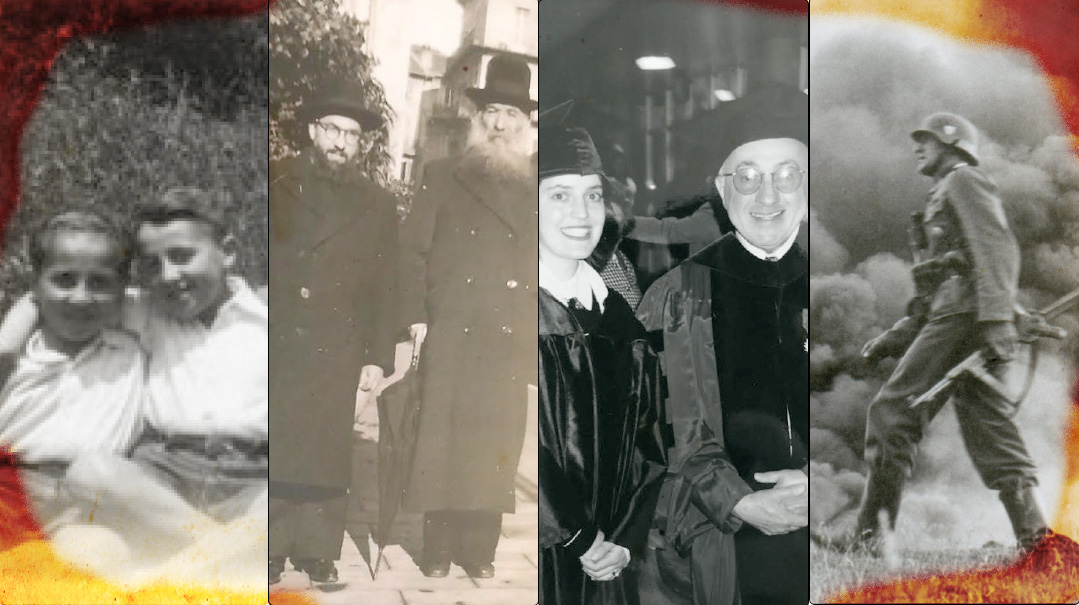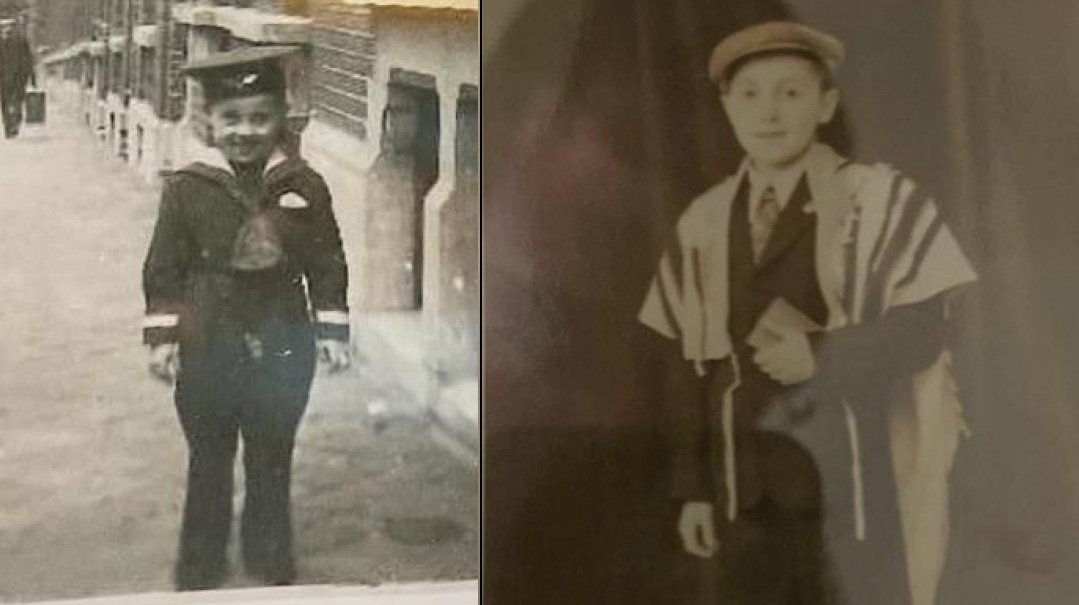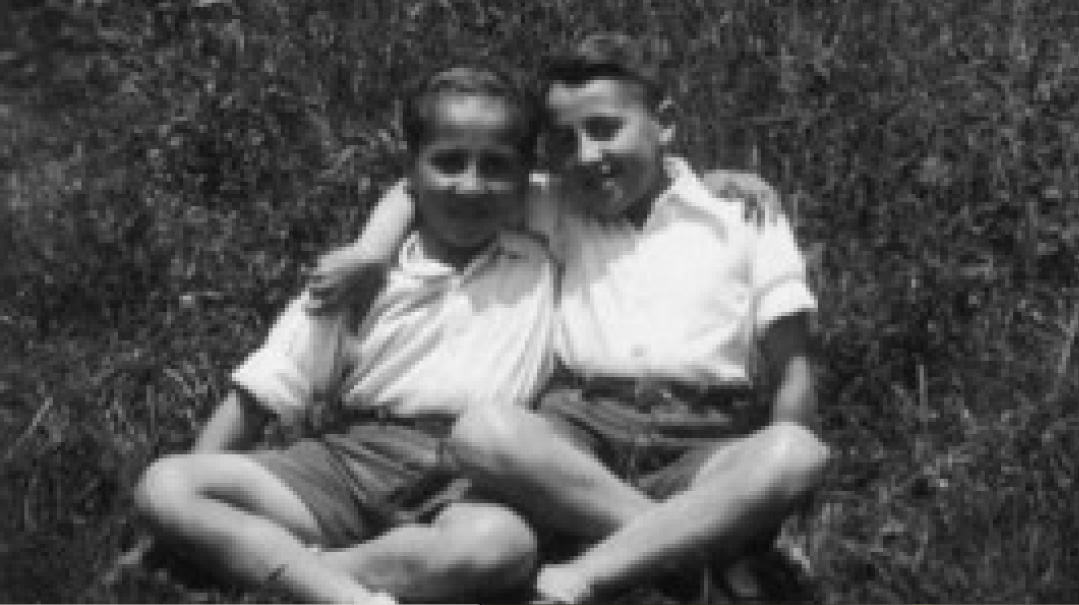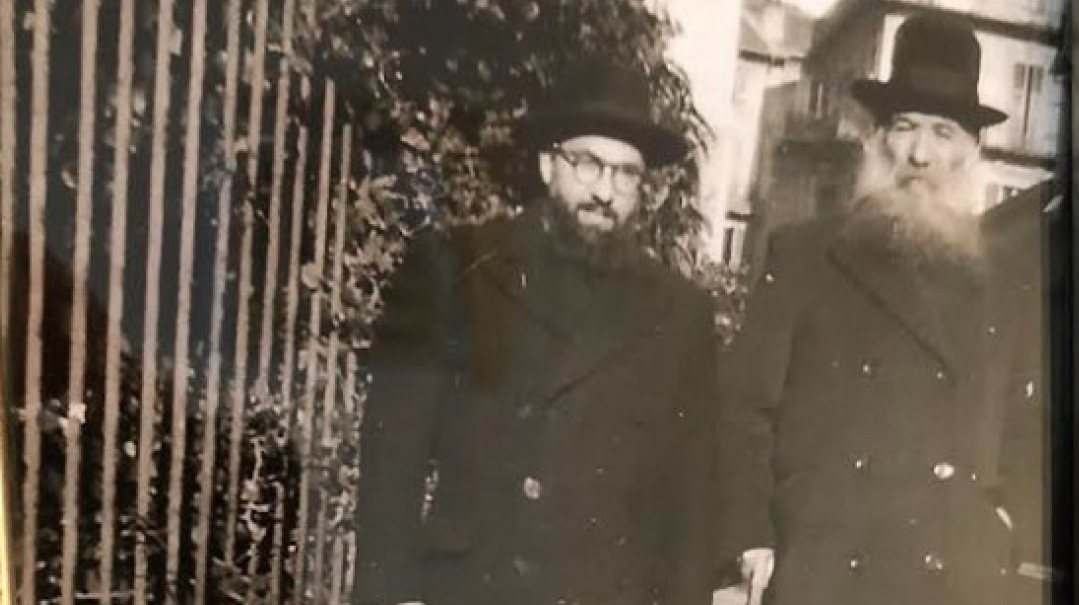One Step Ahead of the Nazis

The war years meant being shunted from one hiding place to the next, never knowing if my brother and I would be discovered by the Nazis

As told to Tzivia Meth by Dr. Joseph Sungolowsky
I consider myself one of the more fortunate survivors. I never experienced ghettoes, deportations, or privation. For me, the war years meant being shunted from one hiding place to the next, never knowing if my brother and I would be discovered by the Nazis. It meant separation from my parents, and constant worry over their fate.
But throughout those years of turmoil, I was lucky to benefit from many of Hashem’s kindnesses, including a string of righteous gentiles who enabled my family to keep one step ahead of the Nazis.
I don’t like to give out my age, but if you must know, I was born in December 1931, in a little town called Charleroi, Belgium. My father, Rav Aron Gershon Sungolowsky, who hailed from Lithuania, was the town rav. I had an older sister, Fina, and a younger brother, Leon. My mother, Esther (née Berger), was originally from Vienna.
On Friday morning, May 10, 1940, Stuka bombers streaked through the sky, unleashing devastation on Charleroi. I was just eight years old — and the German invasion of Belgium had begun. Scores of people, Jews and non-Jews, crowded onto trains and every available conveyance to flee southward, away from the advancing German army. Amid the chaos, we boarded a train of refugees fleeing to France. There was barely room to stand. You want to know what I packed? I’ll tell you: very little. We couldn’t bring more than a few valises, that was it.
It turned out, though, that the French side of border was no safer than the Belgian side. Soon after we crossed into a town called Lobbes, the Germans bombed our train. Pandemonium erupted. Everyone fled the train, seeking refuge in the countryside. My father, though, stayed put.
“We are not going anywhere, we’re staying here,” he declared.
We were traveling with my 83-year-old grandfather — my mother’s father, Abraham Berger — who had lived with us since the Anschluss, and my father knew he was in no condition to run. It turned out to be the right decision, as many people who left the train were killed by the bombs. Miraculously, we remained completely unharmed.
After spending a few nights in a barn, we arrived, completely exhausted, in the town of Vichy. The Jewish community housed us in the Hotel Charmel, which had become a meeting place for refugees. Every day, they would congregate on the veranda, searching to find someone they knew.
Still a young child then, I wasn’t privy to any of the adult conversation, but I do remember the delicious vegetable soup the kitchen served. It was also there that we first met Rav Menachem Mendel Schneerson, the future Lubavitcher Rebbe. Later, when I went to greet him as the Rebbe in New York, he told me he remembered my father. I still have the dollar he gave me.
But none of us was able to stay in Vichy for long. By the end of June 1940, France had surrendered to Germany, and the noose tightened again. We joined the throngs fleeing southward — this time to Nice, which was then under the relative safety of Italian control.
Nice was a haven for war-torn Jews — including many distinguished rabbanim. Not only did Rav Schneerson take refuge there, but also the Kozhnitzer Maggid and Rav Elie Munk of Paris. I remember Rav Munk bicycling past our apartment every morning, on his way to supervise the matzah baking. My family also had a personal connection to him; when Rav Munk’s son was born in Nice, my father served as the mohel.

Joseph, age 7 , in Charleroi, Belgium before the war (left): Joseph’s bar mitzvah in Nice right after the war (right)
WE managed to remain safely in Nice for three years, but our hopes for waiting out the war peacefully there were eventually shattered. The Italian army, formerly allied with Germany, surrendered to the Allies in September 1943, and the Germans retaliated within days. I remember the Germans forcing the Italian soldiers to march through the streets at gunpoint, like common prisoners. The Germans immediately began to arrange roundups of Jews for deportation.
My father knew as soon as the Germans entered Nice that we had to go into hiding. Denunciatons of Jews to the Gestapo were rampant — any neighbor was liable to turn us in. But where would we hide? There was an elderly widow who lived nearby, whom we called “Cousine Rose” — we used to sell her our chometz. My father thought that she might shelter us. My grandfather had passed away two years earlier, before the German takeover of Nice, so it was just my immediate family.
“Our lives are in danger, maybe we can stay with you?” he begged.
She said, “I’m not too crazy about it, but I’m going to do it anyway.”
Her apartment was too cramped, though, to house all of us. She agreed to take in my father, my mother (who slept in the kitchen), and my sister Fina, but my brother and I had to find refuge elsewhere.
You know, Hashem always helps you. Before going into hiding with Cousine Rose, my mother had taken me with her to speak with Monseigneur Paul Rémond, the bishop of Nice, in the hope that he could help us find a hiding place.
The bishop received us very warmly and said, “Look, I’m working on this. I’ll try to do the best I can for you.”
And we left. There was no promise whatsoever. But let me tell you something, one of the Chassidei Umos Ha’olam — that’s who Rémond was. And he did help us — in conjunction with Moussa Abadi, a Jewish rescue activist also known as “Monsieur Marcel,” the bishop not only found hiding places for Leon and me, but eventually saved 527 children during the war.
The first place they found for us was the Cottage Bellevue, a boarding house for younger children run by a gentile couple, Monsieur Paul and Madame Lemas. We were not the only Jews hiding there — a Mr. and Mrs. Rosenbaum, with their daughter and her fiancé, plus an elderly couple named Bialystok, were also given refuge.
My brother and I were treated well, but after weeks of separation, nothing could shake my desire to see my parents again. And so, heedless of the danger, I took a bus one Sunday morning to the area of Nice where I thought my parents might be hiding. I made inquiries until I found the exact address. My parents were rightfully alarmed at my unexpected visit, and at the danger it put all of us in. But at nine years old, I was just overjoyed to see them, and didn’t give much thought to the risk I had taken.
I spent a happy afternoon with my parents, and before I left, my mother handed me a bag of grape jam sandwiches. This wasn’t a luxurious meal by any standard, but because my mother had made the jam herself, these sandwiches were very precious to me.
On the way back to the boarding house, I faced a new problem: how to hide my sandwiches from Monsieur Paul and Madame Lemas. If they realized that I had been to visit my parents, I would be in severe trouble. The best hiding place I could think of was a high shelf in the closet in the children’s room. The next day, though, Monieur Paul discovered the offending sandwiches. He went around and interrogated each child.
“Who brought these here?” he demanded.
“I’ve never seen them before,” I replied, not daring to admit my guilt.
He threw them out, so I never got to taste my mother’s sandwiches.
The other Jewish families at the boarding house had much more serious worries. As adults hiding at a children’s boarding house, they were much more vulnerable to discovery. At one point, they decided it would be safer to sleep in the basement, which was only accessible via a trap door. But since the trap door was wooden, they feared that Germans stamping on it would detect the hollow space underneath it — and they would be finished. So they covered the door with cement, and placed a carpet above it to remove any suspicion. My brother and I stayed down there temporarily as well, even though we blended in at the children’s home far better than the adults did.
Unfortunately, the families couldn’t tolerate the conditions in the bare, unventilated basement, and decided to return to their rooms. It was a disastrous choice.

Dr. Sungolowsky (on right) with his brother Leon in 1943 in Villard de Lans, France (where they hid briefly)
Only a few weeks later, in the middle of the night, the Gestapo burst into the Cottage Bellevue. Someone had clearly snitched. The Nazis dragged out Mr. and Mrs. Rosenbaum with their daughter (her fiancé had fled shortly before this), as well as the elderly Mr. Bialystok. For some reason, they left Mrs. Bialystok alone. Then they turned to search the rest of the building.
Madame Lemas breathlessly entered the children’s room and quickly apprised my brother and me of the situation. “Cover yourself with the blanket and pretend you are asleep,” she ordered.
We were terrified. A few moments later, she returned to our dormitory — accompanied by the Gestapo. They shined their flashlights on the children’s faces, looking for Jewish features. They soon reached us.
After a few heart-stopping seconds, Madame Lemas said, “Don’t touch them, they are my children.”
The Gestapo opened the back door to check if anyone was hiding there or attempting to escape. Then they left. They could have done further checking, but they didn’t. It was an open miracle.
My sister Fina came to visit us the day after the raid, as she did on a fairly regular basis. I told her about what had happened.
Stunned, she declared, “You’re not staying here one more day!”
True to her word, Fina came the next day with a representative from Monsieur Marcel’s network to move us to a new location. We were on the run yet again.
With Marcel working hand-in-hand with the bishop, it was not suprising we ended up in a Catholic institution at one point during our months as fugitives. At the Collège Sasserno, the Catholic boarding school where we were hidden next, the fathers were wonderful people.
The father superior said, “I only ask of you one thing — you are to come to mass every morning.”
This was not an attempt to convert us, but rather a stratagem to help us blend in with the other children. To this very day, I still know quite a bit of the mass. But for me, what was most memorable about the Collège was that it was right next door to the apartment my family had lived in for three years before the German invasion. This made my loneliness much more painful to bear.
Over the next few weeks, the Marcel network shunted us from one location to the next — desperately trying to keep us away from informants and collaborators. But in the winter, Leon and I finally reached our last stop before the war’s end: the Pension Bon Accueil, a boarding school near Grenoble in the French Alps. We would be sheltered there for most of the following year. Directed by Monsieur and Madame Saint-Luc, it was attended by many well-to-do non-Jewish children, whose parents wanted them out of the city and in the fresh mountain air.
My brother and I, under the aliases Joseph and Léon Baroux, blended in fairly well, but with one painful difference — which came to the fore every afternoon at four o’clock. Every day at that hour, all the children lined up to receive an afternoon snack of cookies, as well as mail from their parents. Cookies I could get, but not mail from my parents. This made me sick with distress — and determined to come up with a solution.
Casting about for some way to contact my parents, I suddenly remembered something my father had told me before we had gone into hiding. “If you want to communicate with us,” he said, “write to Madame Tosti, our Italian neighbor, and address the letter to ‘My Dear Aunt.’”
So that’s exactly what I did. Soon I got a response — my father had very nice handwriting — I recognized it right away. We corresponded for a while, with my sister Fina acting as courier to bring our mail from Madame Tosti’s mailbox to my parents’ hideout. But our secret message system was short-lived. Monsieur Saint-Luc, not meaning to do any harm, mentioned the letters we received to Monsieur Marcel. We were severely reprimanded for putting everyone in jeopardy through our correspondence. So that was the end of our contact with my parents.
Though we were posing as Protestant boys, whenever Monsieur and Madame Saint-Luc were able to accommodate our Yiddishkeit without arousing suspicion, they did so. My father had presented us with two machzorim, one for Rosh Hashanah and one for Yom Kippur, before we went into hiding.
I showed them to Madame Saint-Luc when we arrived, and she said, “I will take care of that. When the time comes, I will let you know.”
And when the Yamim Tovim came — I don’t know how she knew — she said, “Come to my salon, and you can stay there as long as you like. I have the books for you, and you can pray. When you are finished, you let me know.”

Dr. Sungolowsky’s father Rav Aron Gershon Sungolowsky (on left) with Rav Zalman Sorotzkin in Nice in 1946 after the war
While keeping kashrus properly in the Pension was nearly impossible, I drew the line at eating pork. One night it was on the menu, and finding it laid out on my plate, I quickly tried to think of some excuse that would not identify me immediately as a Jew.
So I hit upon an idea: I licked the pork a bit with my tongue, and said, “This is too salty! I can’t eat it!”
The kitchen staff said, “Don’t worry about it, give it back.”
So I was saved from eating treif.
But despite my relatively carefree existence at the Pension, there was an ever-present worry for my parents’ safety. And as I discovered later, I had good reason to fear. Due to constant denunciations, Cousin Rose told my parents that she could no longer shelter them and my sister Fina.
While scrambling to find a new hideout, my father learned of a newborn boy who needed a bris milah. Of course, performing one would add a whole new level of danger to what my parents were already facing. But Fina pushed my father to do it.
“I’ll be the godmother,” she added for good measure.
Fina had managed to find a villa on the outskirts of Nice through her connections with the Resistance, which they would rent under false names; they decided that Rav Sungolowsky would perform the bris on his way to the new shelter. Thank G-d, he was able to perform the bris and escape to the villa without incident. The baby’s name was Gérard Tugendhaft, and he survived and moved to New York after the war.
While Nazis combed Nice’s streets in their black Citroen cars in search of Jews, my parents managed to escape detection in the villa Fina had found for them. The Allies liberated Nice in August 1944, and Grenoble shortly afterwards — but that did not mean the end of the war for Leon and me. The non-Jewish children all returned to their families, but we had to remain behind; most of the bridges and roads to Nice were utterly impassable due to wartime sabotage. I despaired of reaching home anytime in the near future.
One morning, though, I decided to take matters into my own hands. While taking a walk in the nearby village, I met this older boy I knew, and I said to him, “Do you by any chance know of any way of getting to Nice?”
He said “Really? You want to go to Nice? I know of a truck that’s leaving for Nice tomorrow.”
It was being driven by a fellow named Mr. Heurtain. I ran back to the pension and Madame Saint-Luc immediately contacted Mr. Heurtain to verify the information. He was indeed going to Nice, and agreed to take my brother and me along. Madame Saint-Luc packed us for the trip.
Today, the trip from Grenoble to Nice takes about half a day. Back then, it took us three days, due to all the bombed-out bridges. We took the Napoleon Road — so named because it was the route Napoleon took on his escape from the island of Elba. Adding to the delays of the impassable roads, about halfway along our journey, we got a flat tire. We had to wait quite a while for it to be repaired.
But Mr. Van Cleff, an elderly Jewish man who was accompanying us, found the humor in our situation: “If only Hitler could have gotten such a blow-out!”
Mr. Heurtain took us right to the address of our parents. We got off the truck, we knocked on the door, and my father opened the door. He and my mother had had no idea how to retrieve us from the Pension, due to the travel conditions. It was a very emotional reunion.
I celebrated my bar mitzvah in December, the first one in the Ashkenazi shul after the German occupation. I said my entire pshetl in Yiddish. I still remember the first line: “Tayere elterers un geentere gest” (dear elders and special guests).
My family remained in Nice, where my father served as rav of the Ashkenazi shul, for eight years after the war. During that period I attended and graduated from the prestigious Lycée Masséna (high school), and spent my summers at the yeshivah of Aix-les-Bains under the leadership of Rav Yitzchak Chaikin, a former student of the Chofetz Chaim in Radin.
When my family emigrated to the United States in 1952, I knew right away where I wanted to go: Yeshiva University. I received semichah there from Rav Soloveitchik, and eventually got my doctorate from Yale in French literature.
In 1967, I gave a lecture in Boro Park on French literature. There was a young lady in the audience who had some very incisive comments — she clearly read a lot — and after the lecture she brought me a glass of water.
I asked someone there, “Who is that girl?”
It was a whole research project to find her name and address, but one thing led to another, and today, baruch Hashem, she and I are great-grandparents.
Looking back over my wartime experiences, I can only feel tremendous gratitude. So many children were deported and never came back. Some survived in hiding, only to find their parents gone when the war was over. Not only did I survive, but my parents and siblings survived as well. Through the help of so many — Jews and non-Jews alike — Hashem guided us through those treacherous times, always managing to stay one step ahead of the Nazis.
Dr. Joseph Sungolowsky is a professor emeritus of French literature and Jewish studies at Queens College, City University of New York. He was knighted by the French government for his contributions to French culture in the United States and was awarded the Order of the Palmes Académiques (“Academic Palms”).
(Originally featured in Mishpacha, Issue 977)
Oops! We could not locate your form.







